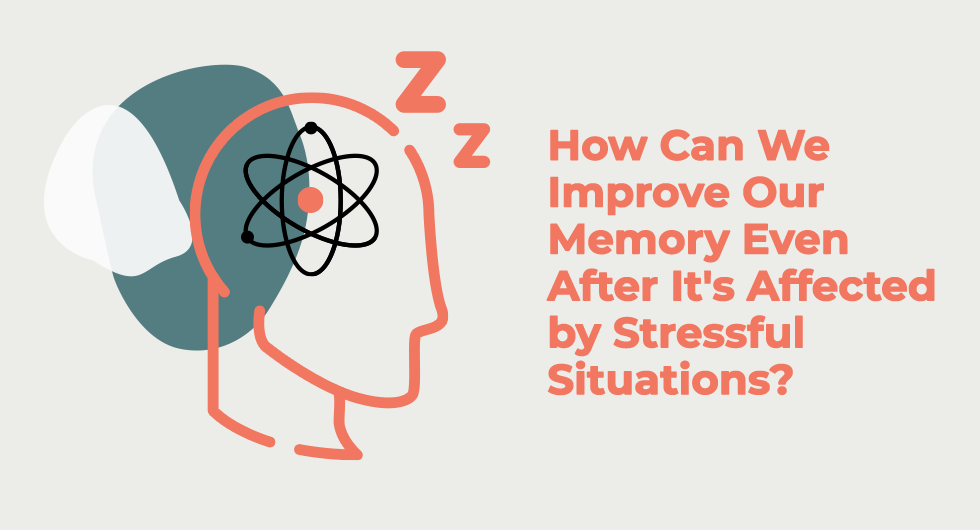Can stress cause memory loss? A lot of people have this concern. Let’s understand how we can address this, and what can be a smarter solution.
Memory, the intricate network of neurons firing to recall faces, facts, and fun times, can sometimes falter.
And one of the major culprits? Stress.
Stress, a ubiquitous part of modern life, can significantly affect our memory capabilities. Understanding how stress impacts memory and discovering ways to mitigate these effects is crucial for maintaining cognitive health.
We’ve all been there – the days when the to-do list is longer than a novel, and it feels like our brain is stuck in a fog.
But don’t worry, it’s not all doom and gloom. Here’s how we can tackle memory issues head-on and have clarity on “can stress cause memory loss”.
Stress Affecting Memory
Before diving into whether stress can cause memory loss and the solutions, let’s understand how stress affects memory.
Imagine your brain is a superhighway of information. Stress is like a traffic jam, blocking data flow and making it hard to recall where you left your keys or the name of that colleague you just met.
Relationship Between Stress and Memory
Stress and memory are intricately linked. Depending on its duration and intensity, stress can affect memory both positively and negatively.
Immediate Effects of Stress on Memory:
In the short term, stress enhances memory formation. This is primarily due to the release of stress hormones like adrenaline and cortisol during stressful events.
These hormones prepare the body for a “fight-or-flight” response, heightening alertness and focus. For instance, you might vividly remember the details of a stressful event.
This is because acute stress increases the activity in the amygdala, a brain region involved in emotion processing. This, in turn, influences the hippocampus, a critical area for memory formation.
Long-Term Effects of Stress on Memory:
However, while short bursts of stress can enhance memory, chronic stress has the opposite effect. Prolonged exposure to stress hormones like cortisol can lead to detrimental changes in the brain.
High cortisol levels over extended periods can damage the hippocampus, reducing its ability to form new memories and retrieve existing ones.
Chronic stress can also lead to structural changes in the brain, such as decreased hippocampal volume, associated with memory impairments.
Can Stress Cause Memory Loss?

In short, yes. Stress causes memory loss
Chronic stress floods the brain with cortisol, the body’s primary stress hormone. When cortisol levels stay high for too long, it can interfere with the brain’s ability to function properly, especially in areas critical for memory, such as the hippocampus.
Stress isn’t just about feeling overwhelmed; it has tangible effects on the brain. Cortisol, often called the “stress hormone,” plays a significant role in this process. Usually, cortisol helps manage stress responses, but cortisol levels remain elevated for extended periods when stress is chronic.
This persistent high cortisol level can start to damage neurons in the hippocampus, which is associated with forming new memories and retrieving old ones.
How Stress Affects the Brain?
Stress triggers the body’s fight-or-flight response, a survival mechanism that prioritises immediate reactions over long-term functions. Here’s a deeper look into what happens in your brain when you’re stressed:
- Cortisol Release: Stress causes the adrenal glands to release cortisol. While small doses of cortisol can help with focus and memory, prolonged exposure can damage neurons in the hippocampus, the brain’s memory centre. This damage can lead to difficulty forming and recalling new memories.
- Impaired Neurogenesis: Chronic stress inhibits the creation of new neurons, a neurogenesis process essential for forming new memories. The brain’s ability to process and store new information is compromised without new neurons.
- Synapse Disruption: Stress can weaken synaptic connections between neurons. Synapses are critical for transmitting signals between brain cells. When these connections are weakened, it becomes harder for the brain to transmit signals and store information effectively.
- Emotional Regulation: Stress can make it harder to control emotions, leading to anxiety and depression. When the brain is constantly alert, it can struggle to manage emotional responses, making individuals more susceptible to mood swings and emotional instability.
- Cognitive Function: Prolonged stress can impair mental functions like decision-making and problem-solving. The prefrontal cortex, which is responsible for these higher-order brain functions, can become overwhelmed by stress, leading to difficulties in planning, reasoning, and thinking clearly.
- Physical Health: Chronic stress has been linked to physical ailments such as headaches, heart disease, and a weakened immune system. The body’s constant state of heightened alert can cause wear and tear on the cardiovascular system and reduce the effectiveness of the immune response, making the body more susceptible to illness.
How to Reverse Memory Loss from Stress?
Alright, enough about the problem. Let’s talk about solutions. Reversing memory loss from stress involves lifestyle changes, mental exercises, and sometimes, professional help.
Here are some effective strategies:
Lifestyle Changes
- Regular Exercise: Physical activity increases blood flow to the brain, promoting neurogenesis and improving overall brain function. Exercise also helps reduce cortisol levels, which can mitigate some of the adverse effects of stress on the brain. Aim for at least 30 minutes of moderate exercise most days of the week. Walking, jogging, swimming, or even dancing can be beneficial.
- Balanced Diet: Eat a diet rich in antioxidants, healthy fats, and vitamins to support brain health. Foods like blueberries, rich in antioxidants, can protect the brain from oxidative stress. Fatty fish, high in omega-3 fatty acids, support brain cell structure. Nuts, seeds, and leafy greens provide essential nutrients that enhance cognitive function.
- Adequate Sleep: Aim for 7-9 hours of quality sleep per night. Sleep helps consolidate memories and repair brain cells. During sleep, the brain processes and organises information from the day, making it easier to recall later.
- Mindfulness and Relaxation Techniques: Meditation, yoga, and deep breathing exercises can reduce stress and improve memory. These activities help lower cortisol levels and promote relaxation, giving the brain a chance to recover from the effects of stress.
Mental Exercises
- Brain Games: Engage in activities that challenge your brain, like puzzles, crosswords, and memory games. These can strengthen neural connections and enhance memory. Regularly challenging your brain with new tasks helps keep it active and engaged.
- Learning New Skills: Picking up a new hobby or learning a new language can stimulate the brain and improve cognitive function. Learning new skills requires the brain to form new neural pathways, which can enhance overall brain health and memory.
- Reading and Writing: Regularly reading and writing can keep your mind sharp and improve memory retention. Engaging with new information through reading and organising thoughts through writing both stimulate the brain in beneficial ways.
Professional Help
Sometimes, professional intervention is necessary. Here are a few options:
- Therapy: Cognitive-behavioural therapy (CBT) can help manage stress and improve memory by changing negative thought patterns. CBT focuses on identifying and altering unhelpful thinking patterns, which can reduce stress and improve overall mental health.
- Medication: In some cases, medications may be prescribed to manage stress and its effects on memory. Always consult a healthcare professional before starting any medication. Medications can help regulate neurotransmitter levels, reducing anxiety and improving cognitive function.
- Neurofeedback: This technique involves monitoring brain activity and teaching individuals how to regulate their brain waves, potentially improving memory and reducing stress. Neurofeedback trains the brain to achieve a more balanced state, enhancing cognitive function and reducing the impact of stress.
How Does the Evolv28 Device Improve Our Memory?

The Evolv28 device enhances memory through its innovative Variable Complex Magnetic Field (VCMF) technology, which harmonises brainwaves using ultra-low magnetic fields.
Here’s a detailed explanation of how it improves memory:
- Brainwave Synchronisation: Evolv28 emits specific frequencies through magnetoelectric fields that help synchronise brainwaves. This synchronisation can enhance neural connectivity, improving the brain’s ability to store and retrieve information efficiently. When brainwaves are in harmony, cognitive processes, including memory, function more effectively.
- VCMF Technology: The Evolv28 device employs a patented technology that generates long variable frequency electric signals. These signals create targeted magnetic fields through an inductor containing ferromagnetic media with magnesium and zinc.
- Enhanced Brain Plasticity: The VCMF technology stimulates brain plasticity, the brain’s ability to adapt and reorganise itself. Enhanced plasticity improves the brain’s capacity to form new memories and strengthen existing ones. It supports learning new skills and retaining information over the long term.
- Science-Backed Technology: Using VCMF (Variable Complex Weak Magnetic Fields), Evolv28 employs advanced technology to promote brain entrainment safely and effectively. Enhancing brain activity supports cognitive functions, including memory, by fostering a healthy brain environment.
- Magnesium and Zinc Integration: Evolv28 incorporates magnesium and zinc in its ferromagnetic media, which are vital for brain function. Magnesium and zinc play crucial roles in synaptic plasticity and neurotransmission, both essential for memory formation and cognitive function. Their presence enhances the brain’s overall efficiency in processing and storing information.
What’s more Evolv28 offers to Overcome Stress?
-
- Stress Reduction: High-stress levels can interfere with the brain’s ability to form and retrieve memories. Evolv28 reduces stress by promoting relaxation and ease anxiety through its soothing magnetic pulses. Lower stress levels create a more stable mental environment, making concentrating, learning, and remembering information easier.
- Improved Sleep Quality: Memory consolidation occurs when the brain processes and stores new information during sleep. Evolv28 improves sleep patterns by helping users fall asleep faster and enjoy deeper sleep cycles. Better sleep quality ensures that memory consolidation processes are more effective, improving memory retention.
- Enhanced Focus and Concentration: The device aids in achieving a state of heightened focus and concentration by emitting frequencies that enhance brain activity associated with attention and cognitive processing. Improved focus allows for better information encoding, which is crucial for memory formation.
- Balanced Mood: A stable and positive mood supports cognitive functions, including memory. Evolv28 helps balance mood by reducing symptoms of anxiety and depression, thereby creating a mental state that is more conducive to learning and memory retention.
- Customised Cognitive Programs: The device offers tailored programs designed to boost specific cognitive functions, including memory. These programs are scientifically crafted to target memory enhancement through structured brainwave entrainment sessions, focusing on strengthening neural pathways involved in memory.
Know The Benefits of Memory Improvement
- Enhanced Neural Connectivity: By harmonising brainwaves, Evolv28 fosters better communication between neurons, enhancing neural connectivity which is crucial for memory formation and retrieval.
- Stress Reduction: High-stress levels can impair memory and cognitive functions. Evolv28’s ability to reduce stress and anxiety indirectly supports better memory performance by creating a more relaxed mental state.
- Improved Sleep Quality: Quality sleep is essential for memory consolidation. Evolv28’s programs enhance sleep parameters, leading to better memory retention and recall.
- Focused Attention: The device helps users achieve a calmer and more focused mind, which is beneficial for concentration and the encoding of new memories.
Conclusion
So, can stress cause memory loss? Yes, stress can significantly impact memory, but it’s not irreversible. Understanding how stress affects the brain and implementing strategies to manage and reduce stress can improve memory and overall cognitive health.
Evolv28 is more than just a wearable device; it is your comprehensive companion for enhancing mental wellness and cognitive functions. Experience the scientifically validated benefits of Evolv28 and transform your approach to health, making every day more productive, calm, and mentally sharp.
Take control of your mental wellness today with Evolv28. With the power of VCMF technology, it elevates your memory, relieve stress, and improves your sleep quality. Don’t wait—start your journey to a healthier, happier mind now.
Purchase Evolv28 and unlock the full potential of your cognitive abilities.
